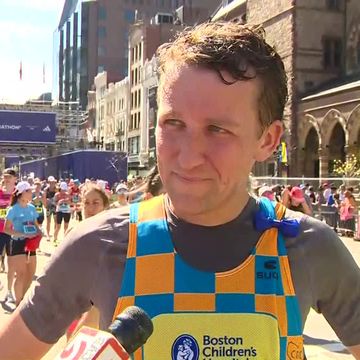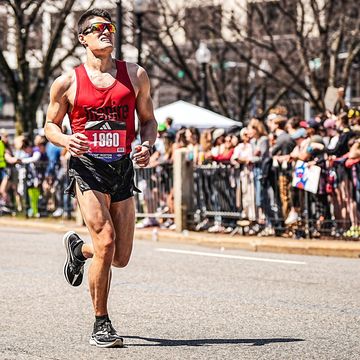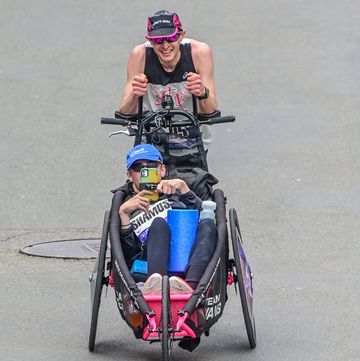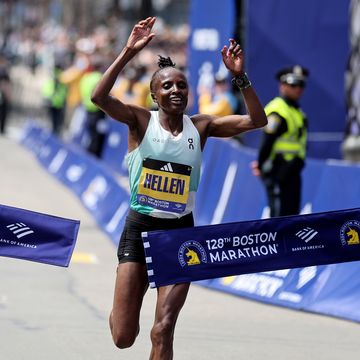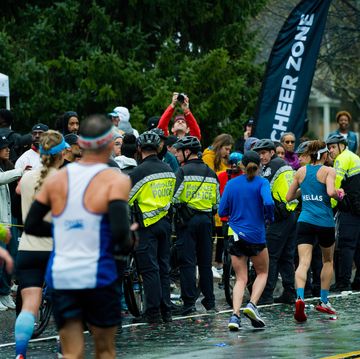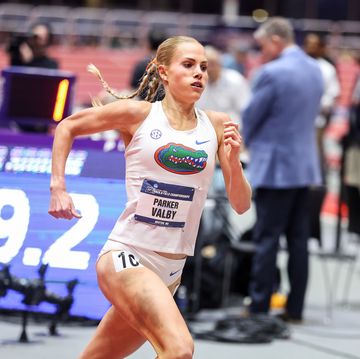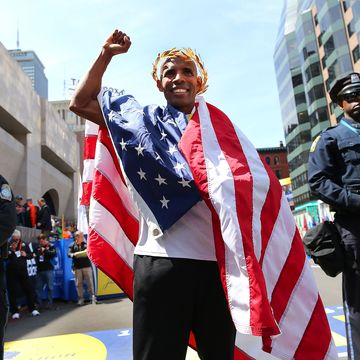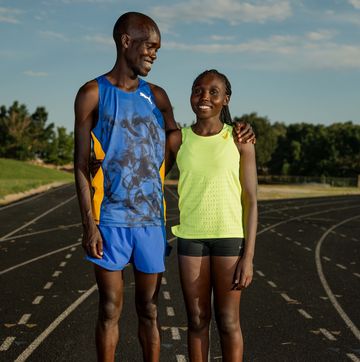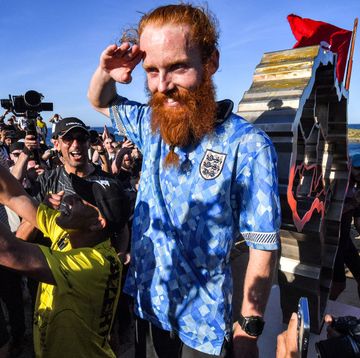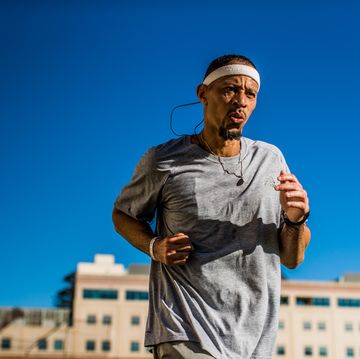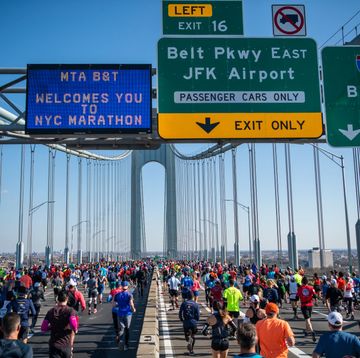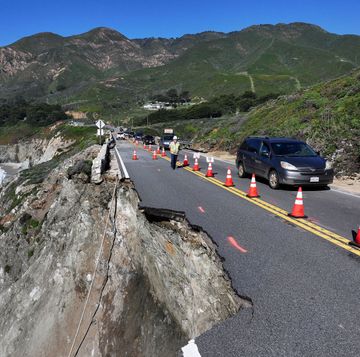A bicyclist won a lawsuit against a runner after a collision on the Roanoke River Greenway in Roanoke, Virginia, three years ago.
A jury in Roanoke City Circuit Court awarded Ann Shepherd $300,000 plus $55,000 interest in July after it concluded William Bundy was at fault for triggering the collision, which took place midday on June 11, 2012. The jury unanimously found that Bundy was negligent and that Shepherd did nothing wrong, Shepherd’s attorney Anthony Russell told Runner’s World Newswire.
According to Shepherd’s complaint, Bundy, now 64, turned around suddenly while running on the path to head back in the opposite direction without determining whether it was safe to do so. Shepherd, now 57, did not anticipate Bundy’s movements and they crashed, causing her to fall off her bicycle and hit her head on the pavement.
The impact cracked Shepherd’s helmet and caused bleeding and bruising of the brain, Russell said. Bundy was “badly bruised” on his left hip and arm but did not require medical attention, Bundy wrote in a statement to Newswire.
Shepherd’s injuries resulted in retrograde amnesia and she was unable to recall if she alerted Bundy that she was approaching from behind, according to court documents acquired by The Roanoke Times. Shepherd testified that it was her habit to call out “on your left” before passing anyone. Bundy wrote to Newswire that Shepherd did not announce herself and that although he did not indicate that he was going to turn around, he did not hear a cyclist approaching.
GET MORE NEWSWIRE: Sign up for the RW Daily newsletter
Bundy wrote to Newswire that he has high-frequency hearing loss in both ears and added that he rarely wears hearing aids except in large, crowded rooms or gatherings. He was not wearing the aids, listening to music, or talking on his phone at the time of the collision.
“I talk with others quite easily on the Greenway,” Bundy wrote. “I hear bikers announce themselves without problem.”
During the trial, Russell called Phil Sparks, a cyclist who regularly rides with Shepherd and who also is a friend of Bundy. Sparks testified that Shepherd regularly makes an audible warning when approaching pedestrians and that she rides at a safe speed.
At the location where the collision occurred, the path is about 10 feet wide. Both Bundy and Shepherd were traveling on the right side of a divider. Bundy wrote he “always” runs on the “extreme right-hand side” of the path and that he took “two steps away from the curb and was hit by Shepherd. There was ample room for her to pass since nobody was coming in the opposite direction.”
No one witnessed the incident, according to a defense motion filed by Bundy.
Shepherd filed a lawsuit in 2013 and originally sought $750,000, the highest amount Russell believed Shepherd could potentially be awarded at the time the lawsuit was filed. The jury settled on $300,000 plus $55,000 in interest to cover $88,499.92 in lost wages and medical expenses, as well as Shepherd’s “bodily injuries and their effect on her health, her physical pain and mental anguish, her humiliation and embarrassment, and her inconvenience,” Russell said. Shepherd declined to comment for this story.
Shepherd’s wound on her scalp still “oozes and crusts at unpredictable times, and her brain injury, while she is able to live her life, affects her on a daily basis,” Russell said.
Bundy, a lifelong runner, wrote that he runs on the Greenway several times a week during his lunch break from work. Bundy wrote that prior to this collision, he had never had a fall or mishap while running.
“On the Greenway, I am a slow, steady runner with neither the ability or desire to set a fast pace,” Bundy wrote. “I wear a watch that enables me to keep up with the time allotted for my run in order to return to work for afternoon commitments.”
Bundy wrote that the flower planter he used as a turnaround marker is 1.5 miles from the YMCA where he typically begins his runs.
“I have done this for years, as do others who turn at varied spots along the course,” Bundy wrote. “There is nothing that mandates where anyone is allowed to turn around.”
A point of contention between the two parties centers on a handful of specific Greenway guidelines posted along the path. Bundy noted two that read, “Pedestrians have the right-of-way, bicycle riders and in-line skaters must yield to all other trail users,” and “Be courteous and notify other users when passing.”
“The posted signs by the Greenway Commission clearly state to bikers their responsibility is to yield to pedestrians and to also announce themselves,” Bundy wrote. “The knowledge that neither happened made the lawsuit ridiculously challenging from the start.”
Russell cited a different guideline, which requires users to “travel in a predictable and consistent manner so as not to cause accidents.”
“If you don’t hear something, it doesn’t mean someone isn’t behind you,” said Russell, who regularly runs on the Greenway. “[Bundy] needed to look before he turned, and then we would’ve avoided this whole incident. When I’m on the Greenway, I always look to see [if someone is approaching]. That’s the thing that struck me as a runner when he testified that he didn’t hear anything, so he assumed it was clear.”
Bundy believes there is nothing he could’ve done to prevent the collision from happening, claiming it is the responsibility of cyclists to pay attention to what is ahead.
“In all my years of running, I have stayed focused on looking ahead and listening for what is coming from behind,” Bundy wrote. “I do not feel the need to keep looking behind during a run.”
Russell said his client, who was riding a mountain bike at the time of the collision, was traveling at a reasonable speed.
“As a runner, I’ve always had a bias against bicyclists because a lot of the time, they won’t call out ‘on your left’ or they’ll just blow through there as if it’s the Tour de France,” said Russell. “When [Shepherd] first came to me, I had that initial bias of you’re a bicyclist, so you must’ve done something wrong. But as I found out further facts, it clearly changed my opinion.”
Bundy wrote that he does not plan to take any further action to try to reverse the ruling.
“I wish I could say I left the courtroom experience with confidence that justice was served, but I did not,” Bundy wrote. “I am a person who tries to look for the greater good. If there is anything positive to prevent this from happening to others, I will be relieved and delighted.”


